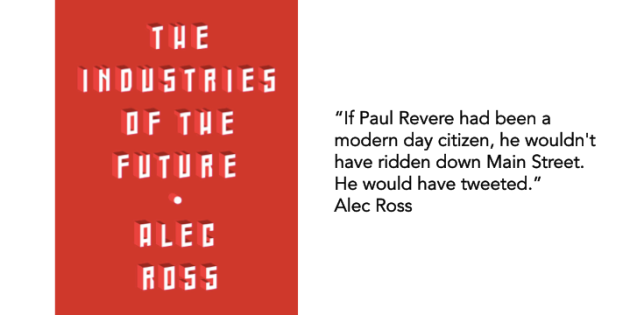

I opened this year’s blog posts by highlighting a dozen exciting books awaiting directors in 2016. With informed perspectives on innovation, hot trends, and interpersonal communication, our boardroom performance can only improve. At some point, I toyed with the idea of reading all twelve in rapid succession, but never made the commitment out loud.
Shortly after my original post went live, however, the authors started sending me advance copies of their books. And with that, I launched into my own suggested reading list.
The Industries of the Future by Alec Ross was among the first to hit my mailbox. When Ross worked as an advisor to the US Secretary of State, he traveled to 41 countries, exploring the latest advances surfacing from every continent. Inspired by his visits to startup hubs in Kenya and R&D labs in South Korea, Ross presents a survey of technologies that will dominate the global economy of the next ten years and beyond.
In my free video training series, I encourage directors to position themselves to address a board’s knowledge gaps. It’s one thing to meet an organization’s needs today, but how can we look ahead over the span of our careers? How do we avoid the dizzying effects of not knowing what we don’t know?
Fortunately, Ross’ research narrows the vast expanse into a manageable short list. And there isn’t an organization out there that isn’t seeking insight into what the future holds. I’m willing to bet that directors with perspective on the following areas will never go hungry.
Robotics
Ross likens the approaching robotics age to the Internet explosion we now take for granted. As life expectancy climbs and birth rates stall, a burgeoning geriatric population will rely on robots for mobility and personal care. Toyota has already built Robina, a 4-foot tall nursing aide modelled after the Jetson’s housekeeper. As Ross explains, “just as Japanese companies reinvented cars in the 1970s and consumer electronics in the 1980s, they are now reinventing the family.”
The future is already here in our hospitals. More than 1 million Americans have already undergone robot-assisted procedures, including cardiac valve repair and colonoscopy. Today, robots translate surgeons’ gestures into more precise micro movements. In the future, medical researchers may use nanorobots to deliver treatments right at the cellular source of disease. And in the meantime, a robot equipped with a network-enabled camera already stands in for students whose compromised immune systems keep them away from school.
Genomics
The chapter dedicated to genomics opens boldly: “The last trillion-dollar industry was built on a code of 1s and 0s. The next will be built on our own genetic code.” And Ross has good reason to take this confident stand. The International Human Genome Sequencing Consortium mapped the first genome at a cost of $2.7 billion. Over the next ten years, the cost dropped “a million-fold”, according to one MIT/Harvard researcher. That expert feels continued cost efficiencies will unleash private sector investment into new diagnostics and therapies for cancer, mental illness, and the effects of aging.
Cybersecurity
The governance community is all too familiar with the cybersecurity industry that Ross cites as another incipient field. Between 2000 and 2020, the cybersecurity market will have grown from a $3.5 billion market employing a few thousand people to $175 billion market supporting every kind of business. Ross implores Fortune 500 leaders to seek out a board member with cyberexpertise. Just as boards once sought audit experts, in five years “any board of directors without a board director with expertise in cyber will be perceived as a shortcoming in corporate governance.”
Big Data
Ross also prompts directors to rethink data’s role in their organizations and markets. When we think of big data today, efficient supply chains or Netflix’s recommendation engine may come to mind. Ross takes it a step further, simmering financial institutions down to giant ledgers that record people’s debts and assets. “At heart, that’s a data problem”, one that views banks as technology companies with data as their core business. He extends the illustration to agriculture, where Monsanto’s CTO predicted “I could easily see us in the next five to ten years being an information technology company.”
The Code-fication of Money
Continuing in the digital space, I found myself even more drawn to the author’s page-turning account of Bitcoin, a digital currency not backed by any government. By logging every Bitcoin transaction publicly and anonymously, the system promises transparency that offers criminals no place to hide.
Although prominent economists like Nouriel Roubini, Alan Greenspan, and Paul Krugman have dismissed Bitcoin’s significance, perception is changing. Larry Summers, former chief economist of the World Bank, recently joined the advisory board of a Xapo, a Bitcoin company founded by LinkedIn’s Reid Hoffman. And Goldman Sachs sent a clear endorsement when it and Chinese investment firm IDG invested $50 million in a Bitcoin company.
Not satisfied with a simple survey of hot trends, Ross views our “next economy” through the lens of social change. He highlights the social consequences of big data and the threat of growing income inequality. Citing the reinforcing dynamics linking social and economic progress, the author expects the empowerment of women and the presence of younger digital natives to contribute to leadership in these future technologies.
These insights are further enhanced by Ross’ boots-on-the-ground view of geopolitics. He describes how Indonesia, Brazil, Chile, Peru, and Mexico are positioning themselves in the global economy. The key, he claims, is openness. Russia, with its policies of extreme control, will not be a player. Innovative and technologically open Estonia shows greater promise. (Pop quiz: Do you know the capital of Estonia? I didn’t, but my children did.)
Perhaps best of all, this book is a surprisingly fun read. Ross tours us around the world – to Seoul, China, Iceland, the Congo, and Silicon Valley – and introduces us to fascinating thinkers. His tone has a TED Talk feel that reminds me of the most engaging dinner party to which I’ll never receive an invitation. Fortunately, we are all on Ross’ guest list as he generously shares his adventurous spirit and boundless curiosity.
Question: Which trends are on your radar screen? How do you inform your view of the future?








